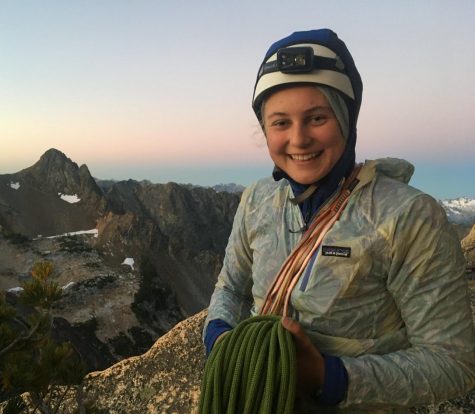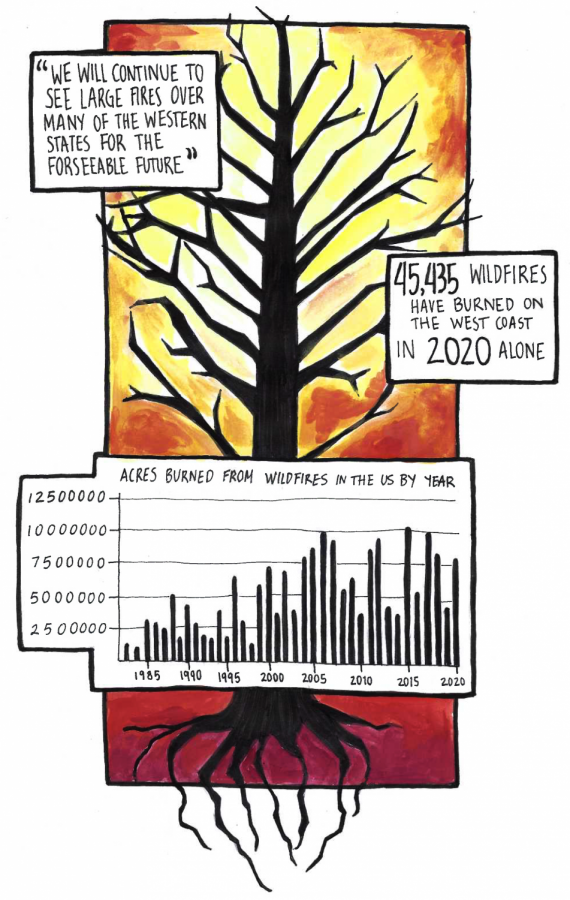Turning Up the Heat
The 2020 Wildfire Season.
So far, 2020 has broken a lot of records, and unfortunately, the West Coast wildfire season is no exception.
Cities in Washington, Oregon, and California experienced apocalyptic-like conditions in the past few months, recording more unhealthy and hazardous air quality days due to smoke particulates in the air than any other year. Across the three states, more acres have burned in the past six months than any other year in recorded history. Why is this wildfire season so unforeseen? The truth is, it isn’t.
Firefighters, foresters, and environmentalists all predicted a catastrophic fire season based on dangerous conditions that have been worsening over the past ten years. Prolonged droughts across the West Coast starting in 2015 led to a mass tree die-off concentrated in California, creating plentiful fuel for wildfires. Record setting temperatures in the past three months (the hottest recorded period on Earth) dried out soil and killed understory growth, creating an abundance of kindling. These conditions are a direct result of worsening climate change; an increase in greenhouse gas emission into the atmosphere leads to a hotter climate as more heat is reflected from the sun back to the earth.
In mid-August, large, colliding storm systems across the West Coast produced unstable atmospheric conditions that resulted in dry lightning storms. The electric charges ignited the perfectly primed fuel all across the coast, creating and spreading massive wildfires in record time. Strong winds helped distribute fire across large areas, spreading fire crews thin as fires continued to ignite. On August 18th, the state of California issued a State of Emergency in response to the out-of-control fires, followed a day later by both Oregon and Washington. In the coming months, the total number of acres burned would pass 7.9 million acres, higher than any other year in recorded history.
Climate change is not only to blame for the historically destructive season: wildfire management strategies also have a large impact on future fire seasons. Since the early 1900s, firefighters have gone to great lengths to prevent and put out wildfires – a seemingly natural response to many, yet one that comes with dangerous consequences. Sue Wozniak, a previous seasonal firefighter while working for the National Park Service and Bureau of Land Management, explains the impacts of fire suppression: “any fire would be put out rather than allowing natural burn cycles. This has allowed a lot of growth of understory vegetation, so that fires become larger on a regular basis. If the understory were allowed to burn on a regular cycle it would theoretically reduce the incidence of larger fires that we see regularly now.” Many Native American cultures, such as the Mono, Karuk and Yurok tribes in Northern California, practiced annual controlled burns of understory vegetation to prevent the build up of dangerous wildfire kindling. Western settlers outlawed these practices starting in the 19th century and land management has only recently acknowledged the helpfulness of a natural burn cycle, issuing controlled burn permits to some tribes in California and Washington state.
The combined effects of climate change and land management are clearly visible in wildfire data from the past few decades; the number of acres burned by wildfires each year is quickly increasing, while the number of wildfires decreases. On average, a wildfire from 2010 burned 57 acres from land. As of October 11, 2020, an average wildfire burned 176 acres.
What does this mean for the future of the West Coast? Can we expect to have a “normal” fire season next year? The short answer is that red skies and smoky air should become our new normal. Wozniak says, “I believe we will continue to see large fires over many of the western states for the foreseeable future.” Climate change is wreaking havoc on our planet and will continue to produce record-setting wildfire seasons unless greenhouse gas emissions are curbed and land management replaces their outdated practices.

Rylee is a senior and this is her first year on The Messenger. She loves being active outside, especially rock climbing, backpacking, and backcountry skiing....




